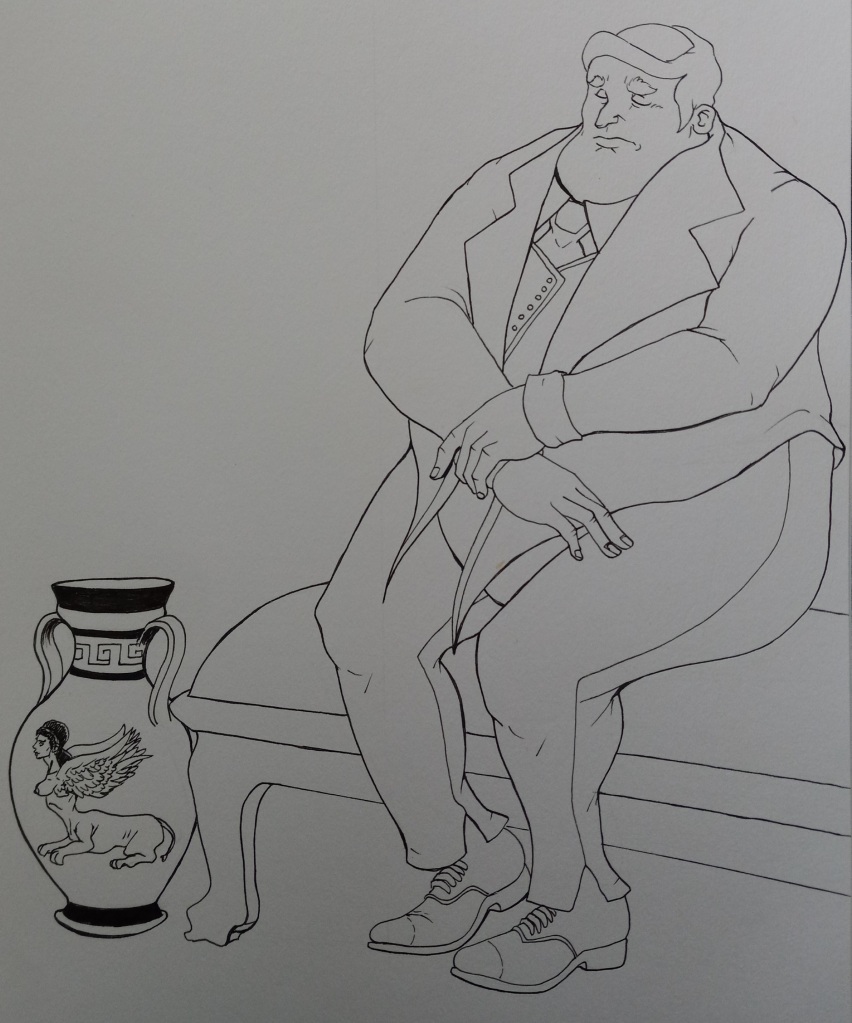

Another finalized illustration for a horror novella I am writing and illustrating to distract from the demon gnawing at my ankle. Hopefully I will have finished it by this Summer.
Ars Vivendi, Ars Moriendi


Another finalized illustration for a horror novella I am writing and illustrating to distract from the demon gnawing at my ankle. Hopefully I will have finished it by this Summer.






















Valkyrie fertile with decay
on the war-march from day to day
to stay the Rot at limb and head
while it writhed alike life to spread
its fungal roots beyond the skin
so then Without was as Within,
for war brings rot, as does such death
long denied by the shibboleth
of an Order conceited by
the power of a Golden lie.
O Red Queen, you were but a pawn
to a god and the crimson dawn
which dwelled within your pallid breast,
aswarm with each unwanted pest,
the bastard children of an age
unwelcome by Queen, Lord, or sage,
nor the mother from whom they bloomed
as from a corpse a time entombed.
O Red Queen, you were blind before
the fairy of the river bore
your changeling vision of a dream
of a swordsman blue in the seam
and flowing with the dancing blade
whereby the Rot could be forbade.

But what good was this fairy light
when blue wisps bleed themselves to fight
those that trespass along the flow
of the underworld and its glow?
A standstill was all the accord
your vampiric sword could afford,
nor could unalloyed gold buy aught
when its slash also fed the Rot.
Blind to Fate and its witless path,
blind to the blooming aftermath,
your pride full-fraught with self-defeat
and the fear to flee or retreat;
a fear of loss, a fear of shame,
losing all to retain your name:
“The blade of Miquella,” you say
though from him you were led astray.
Fate is a sky of fickle stars
held in place, and their pockmark scars
are not so deadly as the blood
spilled by a family aflood
with the great anger that shatters
all the lands, and runic matters.
Is that why you bore so much scorn
for a brother whose strength inborn
was as gigantic as his size
as he stayed the falling skies?
Or was it his hair that was red
like your hair, flowing, as if bled
from a fell wound not yet healed
from amidst an old, snowy field
whereat the curse of thrones arose
within the thorns and hammer blows?
He stayed the stars all alone,
though festering in blood and bone,
nor needed help, even when cursed:
he had wished to be like the First.
Now he devours those left behind
along the dunes, his blighted mind
riddled like Caelid’s countryside
while horrors grow from putrid pride.

Nothing stymies the spreading pox,
nothing uproots the bloody stalks,
nothing removes the fungal blooms,
nothing seals the spore-spewing plumes
nothing staunches the brimming pools,
nothing helps but Miquella’s tools.
And now your twin has gone afar,
awaiting the foretold Blood Star
while cocooned like a butterfly
soon to wake, a dream god whereby
nightmares may take shape at long last
in a bloody gold alloy cast.
Or so some may guess. But who knows?
Rykard is dead, yet he regrows.
The sky overhead…is it real?
Or is it false, the Greater Will
trapping this realm in a rock case
like a keepsake stowed in its place?
Is firmanent an onyx roof
and each star a stalactite tooth
of alabaster, or glintstone,
glimmering in the vast unknown?
No, it is an egg that once broke,
the One Great but a gilded yoke
of runic life now gone awry
as Tarnished wage war, kill and die.
What does it mean? It matters not.
This new age belongs to the Rot.
It will set things right once again:
Erdtree, Marika, gods and men.


O friend, have you yet to meet
the unicorns in their froth-maned flock?
Hooves of onyx, fierce and fleet
and their hides pale white like marble block.
Fear them, O friend, and their gaze,
their eyes like pure-polished porcelain
that flinch not from brightest rays
or from any malign course of sin.
They look like frolicking steeds
galloping across the Springtime plains
alike to many horse breeds,
but they will suffer no mount or reins.
Suffer! To suffer, indeed!
For they bridle a man’s life instead,
as they did me, and mislead,
like a mug of witch brew to the head.
Their aspect is not equine,
but headed like babes but a year old,
and their hearts are not divine,
but unfeeling, cruel, deathly cold.
But what favor they show oft
to virgins who dare to travel far
to touch such a mane…pure…soft…
following Virgo, from star to star!
But what of virgins oft said
to be honored among these pure things?
Come, if you dare; lay your head
in their laps and see how their touch brings
a curse such as no man wants,
such a curse of loveless wanderlust
until ones memory haunts
the lonely years, one’s youth gone to rust.










After two years i return to the medium of watercolor.